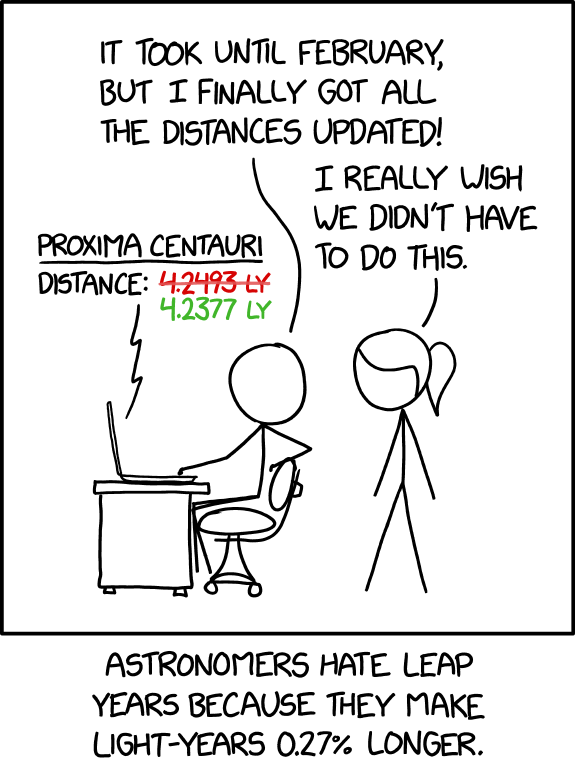this post was submitted on 22 Feb 2024
876 points (98.8% liked)
xkcd
9346 readers
11 users here now
A community for a webcomic of romance, sarcasm, math, and language.
founded 2 years ago
MODERATORS
you are viewing a single comment's thread
view the rest of the comments
view the rest of the comments

Hmmm now that I think about this a light year would be (should be) based on an average year, not what we observe in any given year.
365.2425 days. Different searches give different results but that's what I'm going with.
idk, it feels more intuitive for it to be based on the mode (most common) year length (365) instead of the average year length (365.2425).
The boring answer is that in physics a year is just defined as the time it takes for the Earth to orbit the sun, they don't care about calendars and leap years
I would think that the best time period to use for a light year is whatever year definition has been used to date
Now let's work on the best second to use for the light second
I would've said 365.25 days?
No, years divisible by 100 aren't leap years, except if they're also divisible by 400.
what is this, some sort of FizzBuzz calendar?
Oh right, I had some programming exercise about this, way back.
Interestingly, Wikipedia says they actually did base it on 365.25 instead of the actual 365.2425, so you’re technically right.
I don't think that is what Wikipedia says. Whatever one's thoughts on Wikipedia, I'm pretty sure it is getting this right.
365.25 is what you get if you have leap years every four years with no exceptions. This is what was done in the Julian calendar which was used in the Christian world some centuries ago (how long exactly depends on what part of the Christian world).
365.2425 is the average year length in the Gregorian calendar which we use (where leap years are 1592, 1596, 1600, 1604, 1608, ... 1692, 1696, 1704, 1708, ..., 1792, 1796, 1704, 1708, ..., 1892, 1896, 1904, 1908, ... 1992, 1996, 2000, 2004, 2008, ..., 2092, 2096, 2104, 2108, ...).
The actual average solar year is better approximated by the latter than the former, but it is still slightly off.
This seems pretty definitive to me:
That is pretty much what I said. I was irritated by your wording "the actual 365.2425", which is just another approximation of the "actual" solar year.
Ah, gotcha, yeah fair enough, I could have said “more accurate”
They skip leap years every now and then. And then skip the skip. Etc. The rotation of the earth around the sun and the spin of the earth on its axis simply don't line up into a nice number.
Oh okay. Yeah I only have that rule of "every 4 years" in my head. I did some other programming exercise way back where we had some other rule, but I was thinking that it would end up being the same.
You'd be imprecise for civil timekeeping, but spot on for astronomy
The civil rule is it's a leap year if the year is divisible by 4, unless it is also divisible by 100 unless it is also divisible by 400
We saw the rules play out in 2000 (at least those of us over 23 saw it) which is a year divisible by 100 and by 400 so it was a leap year
Yours (and astronomy's) is Julian style "if it's divisible by 4"
I prefer the newer calendars, where there is no good mental calculation for leap years - it's a leap year when the computer says it's a leap year
I almost certainly won't be alive for it, but it's funny to think about how confused people are going to be when 2100 isn't a leap year.